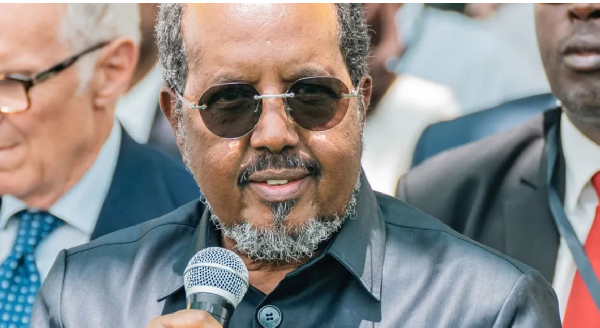By Ghana News
Copyright ghanamma

After months of political bickering and armed confrontation, Somalia’s President Hassan Sheikh Mohamud has taken a surprising step towards reconciliation with Jubaland’s President Ahmed Madobe.
And his declaration, made before Parliament this week, suggests a strategic pivot from confrontation to consensus—one that could redefine federal dynamics and ease tensions across Somalia’s southern regions.
Mohamud told lawmakers on Monday he would make a trip to Kismayu, seeking to change the politics of confrontation into consensus-building.
Kismayu is the interim capital of Jubaland—one of Somalia’s six federal member states, whose leader Ahmed Madobe has been at odds with the federal government for the last one year or so.
To many, this marked a dramatic reversal in Mohamud’s stance towards Jubaland, particularly since Madobe withdrew from the National Consultative Council (NCC)—a forum where federal and regional leaders discuss national issues. Yet it may also be political reality that the intended reform train could derail if stakeholders don’t remain on board.
Madobe quit the NCC in October 2024, dissatisfied with electoral modalities proposed by Mohamud and endorsed by leaders of Galmudug, Hirshabelle, and South West—states often viewed as Mogadishu satellites due to their reliance on federal support.
Mohamud’s administration was incensed when Madobe organised an election in November 2024 that contradicted the federal proposal. Jubaland’s Assembly re-elected Madobe for a third term.
The Federal Government of Somalia (FGS) denounced the move as illegal and labelled Madobe as defiant. A court in Mogadishu swiftly issued an arrest warrant for him on charges of treason.
Predictably, a court in Kismayu retaliated by issuing an arrest warrant for Mohamud, despite his presidential immunity.
The tit-for-tat escalated further when the FGS (Federal Government of Somalia) deployed forces to the Lower Jubba and later to the Gedo region.
Attempts to pressure Madobe into rejoining the NCC proved counterproductive—particularly when hundreds of federal troops sent to Ras Kamboni, over 200 kilometres south of Kismayu, were defeated by Madobe’s loyalists.
Additional clashes erupted in Gedo, especially in Bula-Hawa district, where Mohamud’s appointed security chief, Abdirashid Abdinur Janan, fought forces loyal to Jubaland Vice-President Mohamud Sayid Aden.
Both confrontations resulted in fatalities, injuries, and displacement.
For nearly a year, Jubaland was gripped by hostilities, exacerbated by the FGS’ ban on flights to and from Jubaland towns, paralysing civilian movement.
The central government faced accusations of collective punishment, with the flight ban preventing even the sick from travelling for medical care—particularly to Mogadishu.
It defied expectations that Mohamud would pursue reconciliation, given his commitment to controversial policies such as the One-Person, One-Vote (1P1V) initiative, despite widespread opposition.
The prevailing mantra became loo joojin maa (“we stay the course, no matter what”), disregarding dissenting voices from opposition figures in Mogadishu and leaders in Jubaland and Puntland.
When Mohamud told lawmakers he was shifting course and seeking reconciliation—specifically naming Madobe and announcing a trip to Kismayu—he was met with applause and visible relief from MPs.
However, Mohamud avoided addressing other contentious issues, such as eviction of squatters from public land in Mogadishu, which require both political and legal resolution.
Despite differing opinions, the response was largely positive, with many observers hopeful that talks between Mohamud and Madobe could right past missteps and shift the dynamic from armed conflict to dialogue.
The exact timing of the trip was not provided. But Mowliid Haji Abdi, a commentator, Founder and CEO of Horn Broadcasting Network, speculated that Mohamud would visit Kismayu after Madobe returns from Nairobi, where he has spent recent weeks.
Originally planned for Nairobi, the reconciliation talks were relocated to Kismayu in what sources described as a “confidence-building” measure. Mohamud has insisted the reconciliation talks be held on Somali soil.
Nonetheless, Nairobi remained a hub for influential Somali political figures. In addition to Madobe, Puntland President Said Abdullahi Deni was also present.
Madobe and Deni held meetings in Nairobi to discuss their disagreements with the federal government. Somali analysts suggest they may have coordinated their strategies regarding the national political landscape.
The situation evolved further when a delegation from Mogadishu’s opposition joined Madobe and Deni in Nairobi. The group included members of Somalia’s National Salvation Forum, such as former Prime Ministers Hassan Ali Khaire and Abdi Farah Shirdon, and MP Abdirahman Abdishakur.
The forum, chaired by former President Sharif Sheikh Ahmed, includes several prominent politicians.
Together, Madobe, Deni, and the opposition leaders aligned their positions and announced the formation of a new opposition bloc: Golaha Mustaqbalka Soomaaliya (Somalia Future Council).
The outfit, unveiled on Thursday afternoon, aims to advance opposition goals and provide a framework for resolving disputes through dialogue rather than confrontation.
Its key role will be to unify Jubaland, Puntland, and the National Salvation Forum in coordinating opposition stances on national issues and proposing strategies for Somalia’s political transition.
“The council marks an important step towards cooperation,” Madobe stated after the talks concluded.
Read: Somalia national forum reveals deep political rifts
To many, the council’s formation ahead of Mohamud’s visit to Kismayu signals that Madobe is not acting alone, but as part of a broader coalition with a shared agenda.
Dr Afyare Abdi Elmi, a researcher and professor at City University of Mogadishu, praised Mohamud’s decision to visit Kismayu and engage with Madobe.
“It is encouraging to see that President Hassan Sheikh Mohamud has recognised the limitations of his Mogadishu-centric approach and decided to engage with the leaders of Jubbaland and Puntland,” Dr Elmi posted.
“Better late than never,” he added, noting that “Pressure from opposition groups in Mogadishu and some members of the international community compelled the federal government to reassess its previous policies.”